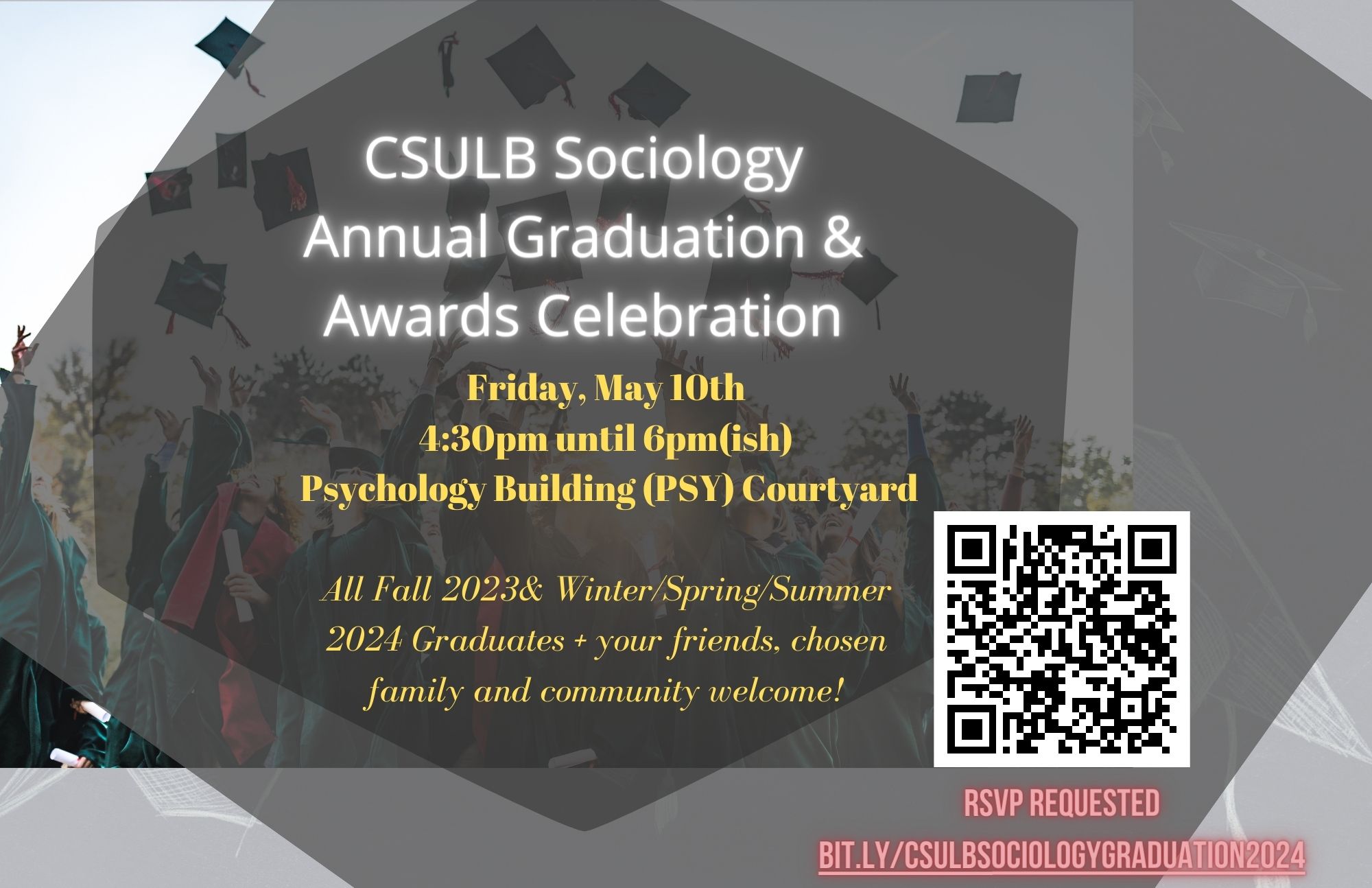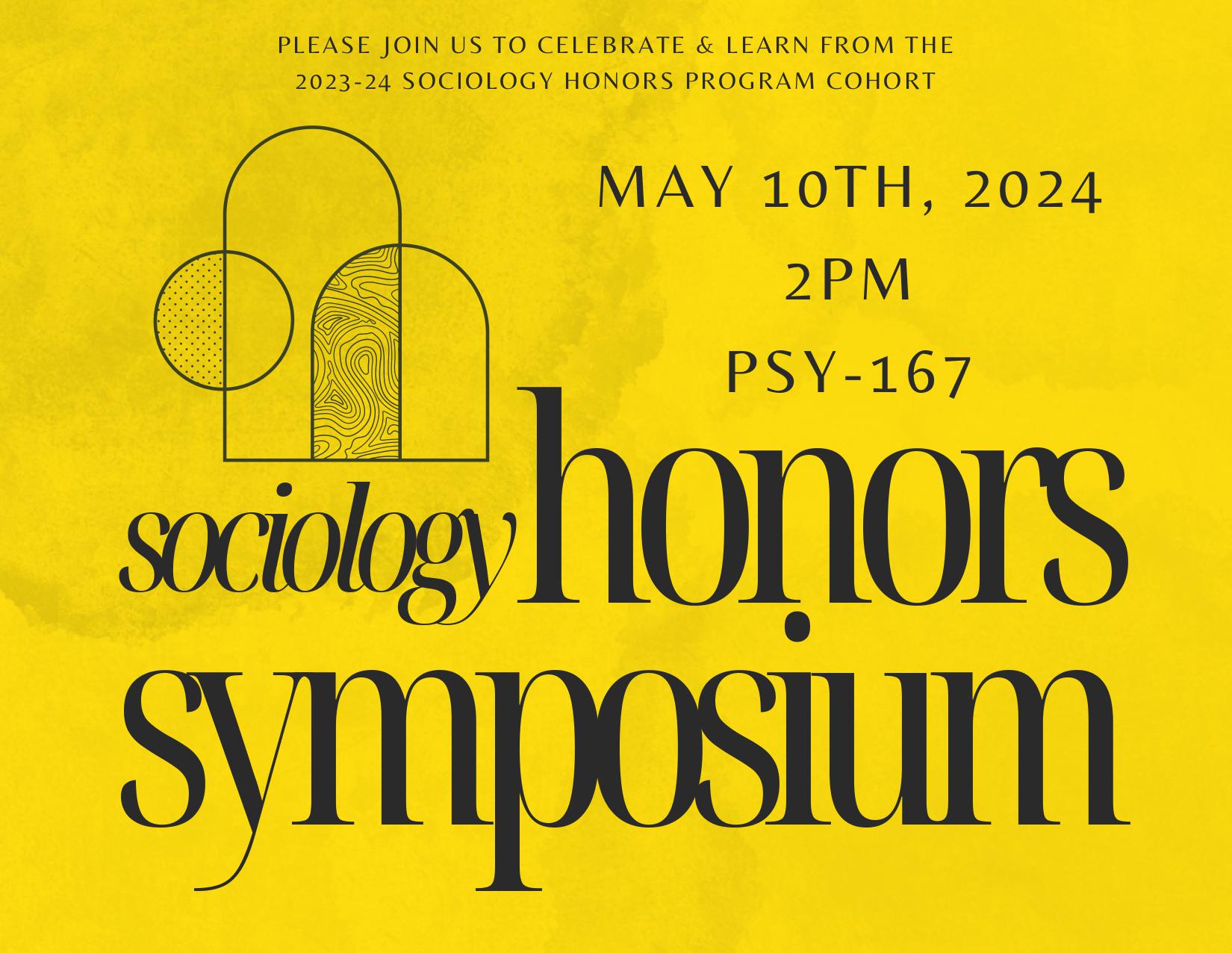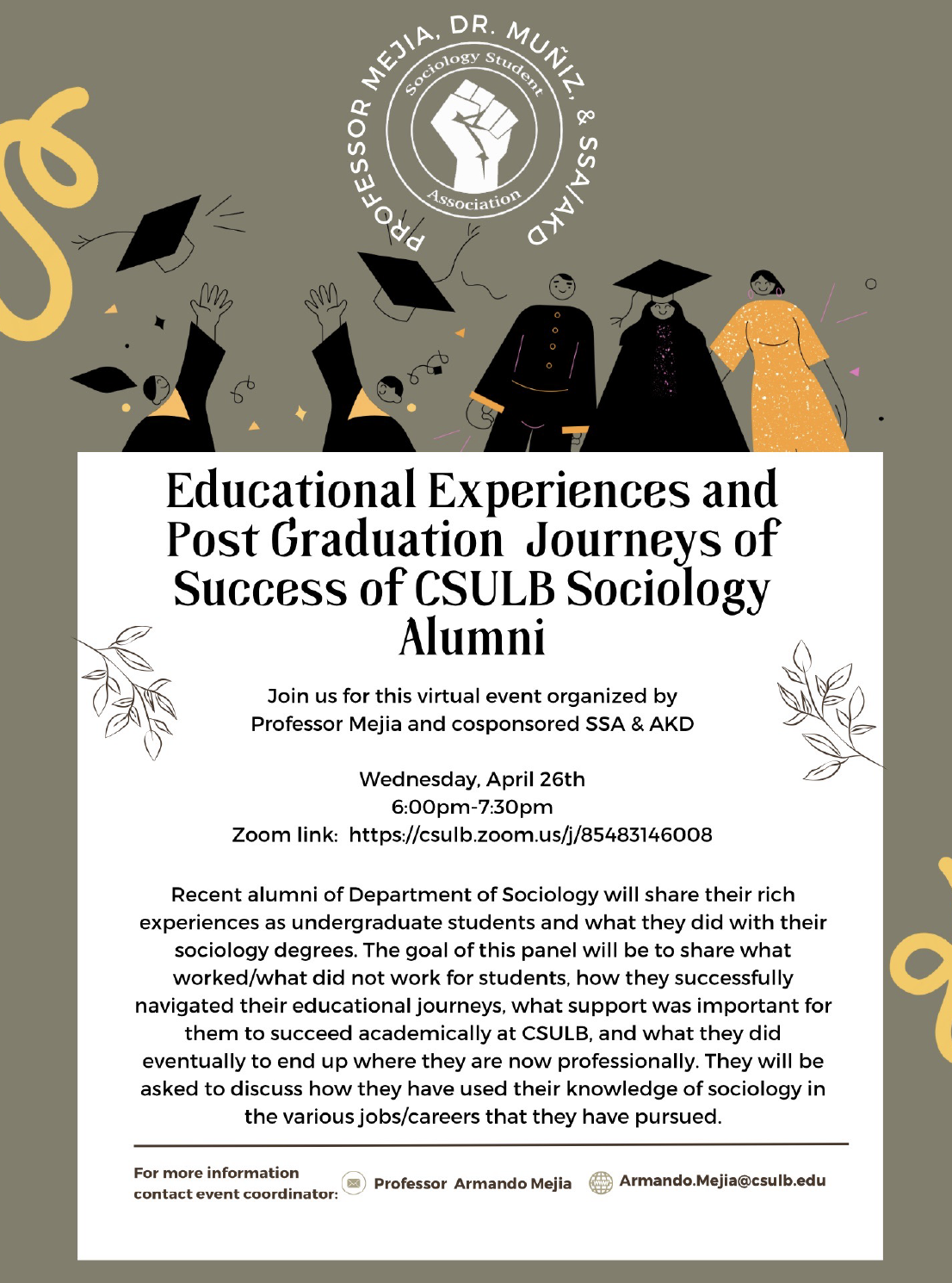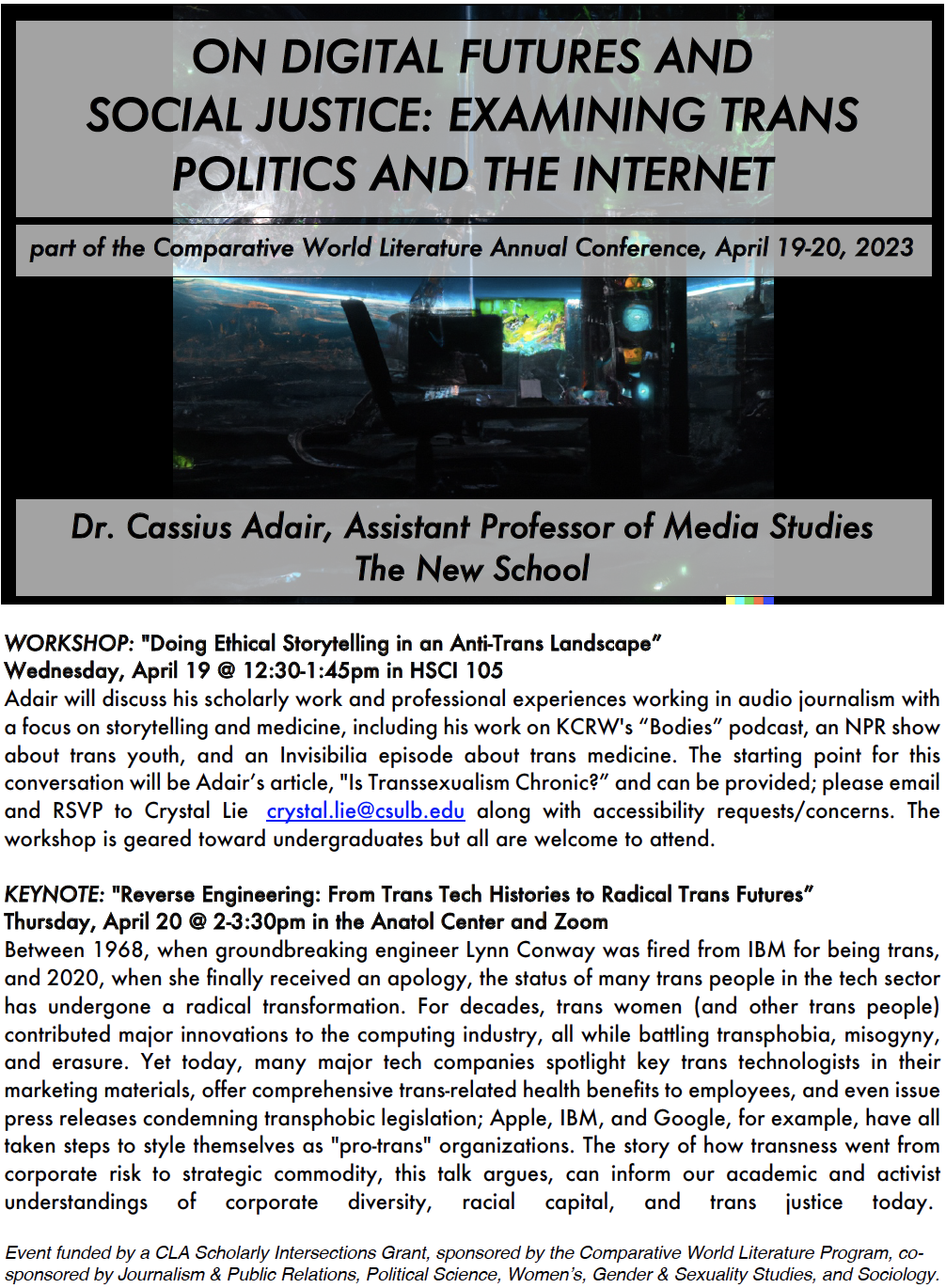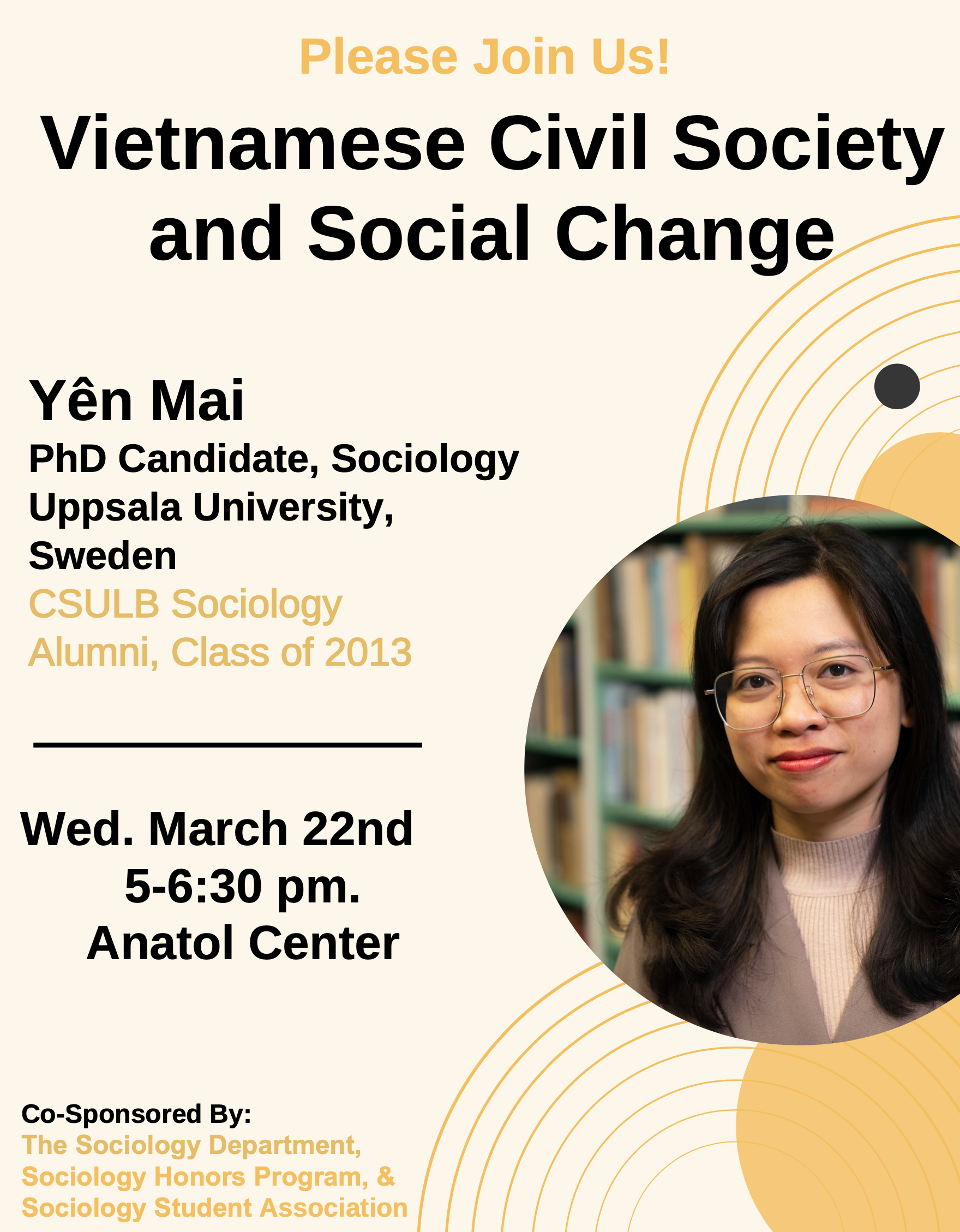Department of Sociology
Welcome to the Sociology Department at CSULB
Welcome to the 2023-2024 Academic Year!
This spring the Department welcomes approximately 850 majors and 75 minors, 200 of whom are transfer students from local community colleges. Our 50+ faculty will teach 110+ course sections, most of which will meet in-person, with about 30% offered online (in synchronous and asynchronous) – please check the CSULB course schedule for more information.
Regardless of instructional mode, faculty members in the Sociology Department at CSULB are committed to the highest standards of pedagogy and dedicated to providing engaging, stimulating, rigorous, and meaningful educational experiences for our students. Our mission is to develop in students the sociological knowledge and skills that will enable them to think critically and imaginatively about society and social issues. Through coursework, internships, independent studies and collaborative research with faculty, the Department encourages a commitment to social justice based on an appreciation of social and intellectual diversity and an awareness of social inequality.
Our Department values diversity and aims to foster an environment that promotes equity and inclusion in all settings. In this context diversity is broadly defined as differences by race, ethnicity, nationality, immigration status, religion, gender, sexuality, class, first-generation status, ability, age, as well as other dimensions of difference. We work to facilitate diversity, equity and inclusion through our research, teaching, professional service, and in our everyday practices. To that end our Department is committed to academic freedom, constructive discourse, and the creation of an inclusive and diverse scholarly community where the dignity and value of all persons are respected.
Department Assistance:
For matters that can be handled via e-mail (including forms that require a signature), please send a message to one of the administrative support staff listed below. If you’d like to speak with one of them via phone, please send an e-mail with your phone number and the best time to reach you, noting the subject matter of your inquiry.
- Administrative Support Coordinator: Kim Glick (kim.glick@csulb.edu)
- Administrative Support Coordinator: Jacqueline Southern (jacqueline.southern@csulb.edu)
For information about Department Advising, including scheduling and contact information click here: https://cla.csulb.edu/departments/sociology/advising/
The Department Chair is also available to help as needed. Please send email messages to: Nielan Barnes (Nielan.barnes@csulb.edu)
_______________________________________________________________________________________
What is Sociology?
What does it mean to understand the world in which you live? What will your contributions be to our changing world? How do your experiences and life chances compare to those of others?
If you are curious about people and society, then sociology is for you.
Sociology is the study of human social relationships and institutions. Sociology’s subject matter is diverse, ranging from education to religion, from the family to the state, from the divisions of gender and social class to the shared beliefs of a common culture, and from social stability to radical societal change. What unifies these diverse topics of study, however, is sociology’s core purpose of understanding how human action and consciousness both shape and are shaped by surrounding cultural and social structures.
Sociology is an exciting and enlightening field of study that analyzes and explains important issues in our personal lives, our communities, and the world. At the individual level, sociology investigates the social causes and consequences of things such as emotions and ideologies, racial identity, sexuality, health and wellness, and crime. At the societal level, sociology addresses issues such as poverty and wealth, prejudice and discrimination, schools and education, law and the criminal justice system, and social movements. And at the global level, sociology studies such phenomena as political power, migration, war, terrorism, human rights and economic development. Students of sociology are challenged to look beyond the “normal”, taken-for-granted views to develop deeper and revealing understandings of the world around us.
Students who have been well trained in sociology know how to think critically about social life and how to ask important questions. They know how to design good social research projects, carefully collect and analyze empirical data, and formulate and present their research findings. The theories and research methods of sociology yield powerful insights into the social processes shaping individual lives, social problems and possibilities for the contemporary world. As a result, students of sociology know how to help others understand the way the social world works and how it might be changed for the better. Most generally, they have learned how to think critically, evaluate, and communicate clearly, creatively, and effectively. These are all abilities of tremendous value in a wide variety of vocational callings and professions.
No less important, students of sociology are challenged to reflect on who they are, who they want to be and how they can contribute their knowledge, skills and talents to our complex and ever-changing world.
Welcome to Sociology at California State University, Long Beach.
We invite you to explore our website and visit our department for information about our major and minor programs, meet the faculty and staff, and learn more about how you can get involved in the department and the community.
Looking for more information? See how sociologists talk about sociology
California State University
Department of Sociology
Statement on Anti-Asian Violence:
Last week, the nation was horrified by acts of violence that left eight people, six of whom were Asian women, dead in Atlanta, Georgia. After taking the lives of Xiaojie Tan, Daoyou Feng, Delaina Ashley Yaun Gonzalez, Paul Andre Michels, Soon Chung Park, Hyun Grant, Suncha Kim, and Yong Ae Yue, the shooter purportedly informed the Sherriff’s office that he’d “had a bad day” and that he viewed the Asian-owned spas that he targeted as contributing to his sex addiction. His targeting of Asian women is indicative of a longer legacy of anti-Asian violence, and the Sherriff Department’s tacit acceptance and dissemination of the shooter’s logic reflects the legacy of hypersexualization of Asian women in the United States that both historically and contemporarily reinforces their dehumanization.
Anti-Asian violence in the United States is not new. It is endemic to the United States and is embedded within the historical and contemporary institutions that we, as Sociologists, study. These include racist immigration policies, media representations, fetishization, cultural appropriation, and the continued dissemination of the model minority stereotype, to name just a few. Over the past year, fueled by racist fears about the global pandemic that were stoked by claims of some U.S. politicians who called it the “China Virus,” we have observed an appalling resurgence in anti-Asian violence across the nation. We recognize the fear and pain that these racist and traumatic events cause many members of our Department, University, and broader community. And we stand in solidarity with the Asian/AAPI Communities against violence and all forms of racism.
As Sociologists, we know that change requires not only learning and reflection, but action. As such, we are including some resources for those who would like to learn more about the history and ongoing patterns of anti-Asian racism in the U.S., along with specific opportunities for action in support of A/AAPI community members.
In Solidarity,
CSULB Sociology Department
To Read
Sherry Cola’s Poem on Anti-Asian Racism
The History of Fetishizing Asian Women (VOX) (with Celine Parreñas Shimizu)
Ignoring the History of Anti-Asian Racism is Another Form of Violence
NPR: The History of Anti-Asian Sentiment in the US (4min. listen)
Organizations and Resources
CSULB CAPS (Counseling and Psychological Services) AAPI Support (and additional social justice resources)
Asian Americans Advancing Justice (National Organization)
API Equality (LGBTQIA+ API Organization in LA)
How to Help Combat Anti-Asian Violence (TIME Magazine list)
__________________

